
Theodore Roosevelt Jr., often referred to as Teddy or by his initials, T. R., was an American politician, statesman, soldier, conservationist, naturalist, historian, and writer who served as the 26th president of the United States from 1901 to 1909. He previously served as the 25th vice president under President William McKinley from March to September 1901 and as the 33rd governor of New York from 1899 to 1900. Assuming the presidency after McKinley's assassination, Roosevelt emerged as a leader of the Republican Party and became a driving force for anti-trust and Progressive policies.
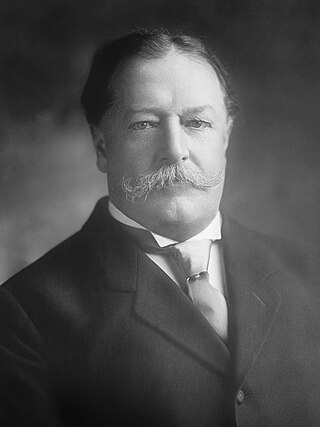
William Howard Taft was the 27th president of the United States (1909–1913) and the tenth chief justice of the United States (1921–1930), the only person to have held both offices. Taft was elected president in 1908, the chosen successor of Theodore Roosevelt, but was defeated for reelection in 1912 by Woodrow Wilson after Roosevelt split the Republican vote by running as a third-party candidate. In 1921, President Warren G. Harding appointed Taft to be chief justice, a position he held until a month before his death.

The 1912 United States presidential election was the 32nd quadrennial presidential election, held on Tuesday, November 5, 1912. Democratic Governor Woodrow Wilson of New Jersey unseated incumbent Republican President William Howard Taft while defeating former President Theodore Roosevelt and Socialist Party nominee Eugene V. Debs.
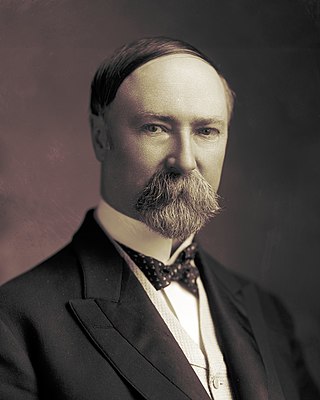
Charles Warren Fairbanks was an American politician who served as a senator from Indiana from 1897 to 1905 and the 26th vice president of the United States from 1905 to 1909. He was also the Republican vice presidential nominee in the 1916 presidential election. Had the Republican ticket been elected, Fairbanks would have become the third vice president to multiple presidents, after George Clinton and John C. Calhoun.
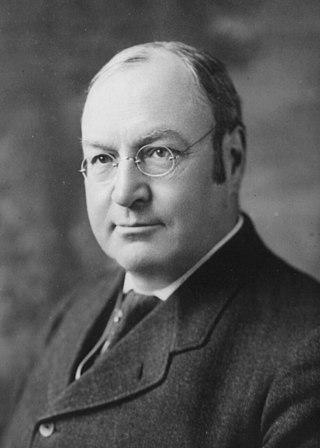
James Schoolcraft Sherman was an American politician who was a United States representative from New York from 1887 to 1891 and 1893 to 1909, and the 27th vice president of the United States under President William Howard Taft from 1909 until his death in 1912. He was a member of the interrelated Baldwin, Hoar, and Sherman families, prominent lawyers and politicians of New England and New York.

Hiram Warren Johnson was an American attorney and politician who served as the 23rd governor of California from 1911 to 1917. Johnson achieved national prominence in the early 20th century. He was elected in 1916 as the United States Senator from California, where he was re-elected to five terms and served until his death in 1945.

Winthrop Murray Crane was an American political figure and businessman.

George Cooper Pardee was an American doctor of medicine and politician. As the 21st Governor of California, holding office from January 7, 1903, to January 9, 1907, Pardee was the second native-born Californian to assume the governorship, after Romualdo Pacheco, and the first governor born in California after statehood.

Frank Swett Black was an American newspaper editor, lawyer and politician. A Republican, he was a member of the United States House of Representatives from 1895 to 1897, and the 32nd Governor of New York from 1897 to 1898.

Franklin Knight Lane was an American progressive politician from California. A member of the Democratic Party, he served as United States Secretary of the Interior from 1913 to 1920. He also served as a commissioner of the Interstate Commerce Commission, and was the Democratic nominee for Governor of California in 1902, losing a narrow race in what was then a heavily Republican state.

Victor Howard Metcalf was an American politician; he served in President Theodore Roosevelt's cabinet as Secretary of Commerce and Labor, and then as Secretary of the Navy.
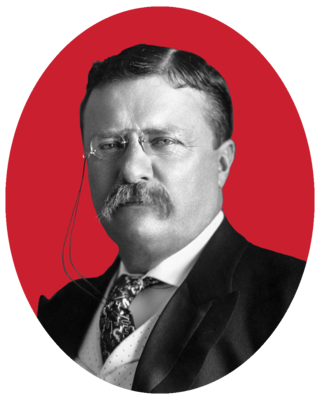
The 1904 Republican National Convention was held in the Chicago Coliseum, Chicago, Cook County, Illinois, on June 21 to June 23, 1904.

Charles Phelps Taft was an American lawyer and politician who served as editor of the Cincinnati Times-Star and owned both the Philadelphia Phillies and Chicago Cubs baseball teams. From 1895 to 1897, he served one term in the U.S. House of Representatives.

The Progressive Party was a third party in the United States formed in 1912 by former president Theodore Roosevelt after he lost the presidential nomination of the Republican Party to his former protégé rival, incumbent president William Howard Taft. The new party was known for taking advanced positions on progressive reforms and attracting leading national reformers. The party was also ideologically deeply connected with America's indigenous radical-liberal tradition.

From March 12 to May 17, 1940, voters of the Republican Party chose delegates to nominate a candidate for president at the 1940 Republican National Convention. The nominee was selected at the convention in Philadelphia, Pennsylvania from June 24–28, 1940.
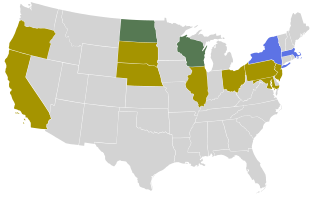
From January 23 to June 4, 1912, delegates to the 1912 Republican National Convention were selected through a series of primaries, caucuses, and conventions to determine the party's nominee for President in the 1912 election. Incumbent President William Howard Taft was chosen over former President Theodore Roosevelt. Taft's victory at the national convention precipitated a fissure in the Republican Party, with Roosevelt standing for the presidency as the candidate of an independent Progressive Party, and the election of Democrat Woodrow Wilson over the divided Republicans.

Charles Stetson Wheeler was an American attorney who served as a Regent of the University of California, and he was a member of the Committee of Fifty working to maintain order after the devastating fire following the earthquake of 1906 in San Francisco. Wheeler was active in Republican Party politics.
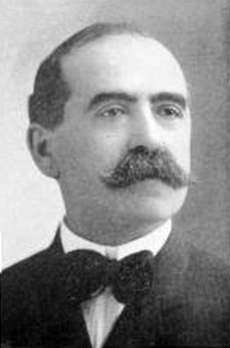
Morris Meyerfeld Jr. was a German-born American entrepreneur who through the Orpheum Circuit dominated the vaudeville market west of the Mississippi for nearly two decades.

The Philippine Constabulary Band was the principal military band of the Philippine Constabulary, and later, as the Philippine Army Orchestra, of the Army of the Commonwealth of the Philippines. Between its establishment in 1901 and dissolution during World War II, it registered a reputation for musical excellence both in the Philippines and the United States, and is credited with being the first band other than the United States Marine Band to provide the musical escort to the president of the United States during a U.S. presidential inauguration. The Philippine National Police Band from Camp Crame,considers the successor to the Philippine Constabulary Band. The Philippine Army Band considers itself as a successor too.
The presidency of Theodore Roosevelt began on September 14, 1901, when Theodore Roosevelt was inaugurated as the 26th president of the United States following the assassination of William McKinley, and it ended on March 4, 1909.



















